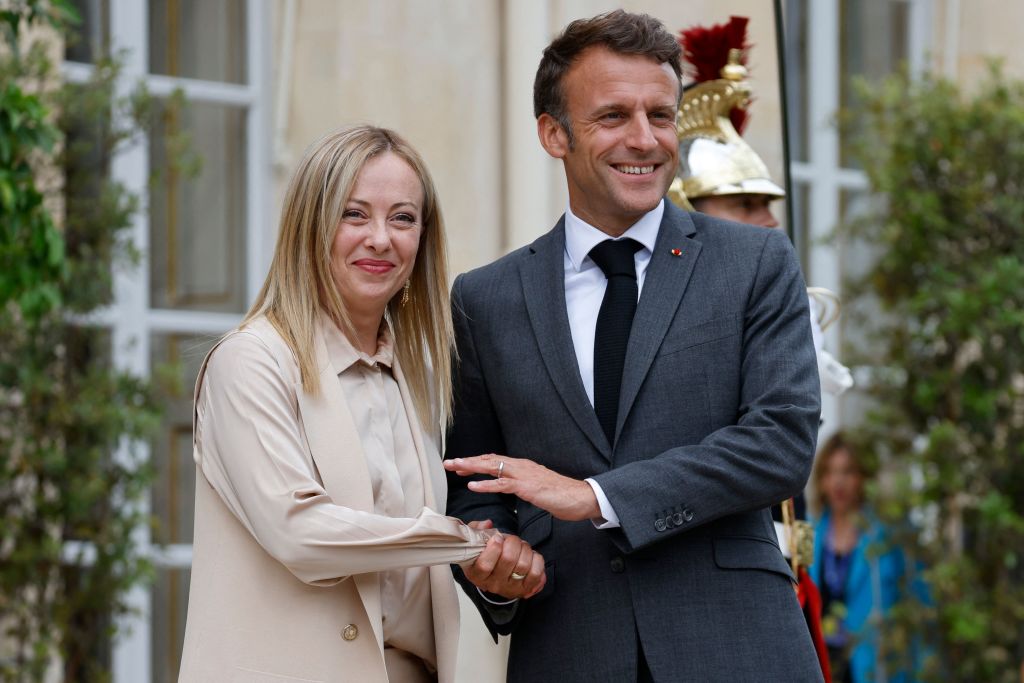All over Europe the right is surging ahead. Everywhere you look, the left is losing — in Italy, Spain, Sweden, Finland, Poland, Hungary and now, following an election victory for the New Democracy party on Sunday, Greece.
In France, the Rassemblement National (the renamed Front National) keeps rising in the polls and now vies for top slot as the country’s most popular party, as does the Freedom Party in Austria. And in Germany this week, the radical and increasingly popular right-wing Alternative für Deutschland won a district election for the first time. The AfD is Germany’s second most popular party according to polls, behind the Christian Democrats but ahead of Chancellor Olaf Scholz’s Social Democrats.
Cue the usual agonized and simplistic commentary about the march of the far right. But one common, if not quite ubiquitous, factor in Europe’s rejection of the left is being ignored. It’s the women. Many of these insurgent and ascendant parties are led, or part-led, by members of what used to be called the fairer sex. The face of the new European right is, increasingly, feminine.
The co-leader of the AfD is a strikingly handsome blonde lady called Alice Weidel. She’s not exactly a predictable conservative: she is a lesbian with a philosophy PhD who opposes gay marriage and Islamic homophobia. She worked at the Bank of China yet is a free-marketeer apostle of Friedrich Hayek.

Forty-four-year-old Weidel is far more economically liberal than Marine Le Pen, the fifty-four-year-old leader of the Rassemblement National, in neighboring France. But the two women share an ability to wrong-foot opponents and are not necessarily harmed by the media’s insistence that they are “far right” or fascist.
France’s centrist President Emmanuel Macron cannot stand for a third consecutive term in 2027. But if he did, polls suggest that Le Pen would comfortably defeat him in a second ballot run-off — by 55 percent to 45 percent.
In Italy, meanwhile, forty-six-year-old Giorgia Meloni, who became prime minister in October, goes from strength to strength. In May, her right-wing coalition won a crushing victory in the city elections even in places where Italy’s communists and post-communists had never lost, such as Siena in Tuscany and Ancona in Le Marche. Meloni said afterwards that there are no left-wing “strongholds” remaining in Italy. The same might well soon equally be said across Europe.
Already blessed with a large majority, Meloni will benefit further from the recent death of her coalition partner Silvio Berlusconi. There were potentially fatal policy differences between the two. Meloni is the most ardent supporter among the leaders of the major EU countries of NATO’s arms to Ukraine program. Berlusconi, a friend of Putin’s, was only ever at best lukewarm.
But now he’s gone and Meloni continues to emerge as the standard bearer of a new European nationalism. It’s interesting that Finland’s new right-populist deputy prime minister, Riikka Purra, was almost instantly compared with Meloni — though Meloni defines herself as a conservative and Purra says she is neither left nor right but “anti-politics.” They both take a hard line on Putin and illegal immigration, however.
Spain looks set to be the next domino to fall to the right in the snap general election called in desperation for July 23 by the socialist Prime Minister Pedro Sánchez after his party was trounced in regional and city elections in May.
His main opponents, the conservative Partido Popular (PP), currently eight points ahead of his party in the polls, are expected to win most seats. And they will be able to govern with the support of the nationalist Vox Party, which would enter government for the first time. The PP’s leader is a man, Alberto Núñez Feijóo, but its guiding force is the passionately patriotic forty-four-year-old Isabel Dìaz Ayuso, who in May was re-elected president of the Madrid region. She is champing at the bit for the PP to sign up with Vox to govern Spain.
It’s noteworthy that none of these women —with the exception of Purra, a married mother of two — has a conventionally conservative private life. Weidel is in a relationship with a woman and has two adopted children. Ayuso is a childless divorcée. Meloni is not married to the father of her child. Le Pen is a twice-divorced mother of three who lives with a female school friend and says that if elected president, she will take her seven cats and their offspring to the Elysée Palace instead of a man.
None of them is a devout Christian. What binds them is the desire to protect conservative cultural values from the creeping intolerance of the left. They all believe that Europe’s roots are Christian and of vital importance — something so famously rejected by the men who drafted the EU constitution (aka the Lisbon Treaty).
Everywhere in Europe, working-class voters have decided that the left is failing to defend their jobs and wages, and their culture and country, in favor all too often of defending the “rights” of minority groups such as illegal migrants and men who call themselves women.
Italy is a perfect example. The Italian left, fresh from humiliating defeat at the general election, appointed thirty-eight-year-old Elly Schlein as its new leader. Like Weidel, she identifies as lesbian. Unlike Weidel, she has three passports (Italian, Swiss, American) and is more interested in defending the desire of a trans woman to use any toilet they like, or in banning cars that run on fossil fuels, than she is in defending jobs and frontiers.
By contrast, during Italy’s recent city elections, Meloni prompted wild cheers (but a furious media reaction) when she said in Catania that of course she is against tax evasion, but only that of the real culprits — i.e. the big banks and multinationals — not the small businesses who cannot afford to pay their staff but are hounded by the taxman to pay the pizzo di stato (pizzo is slang for the protection money the Mafia charges shopkeepers). Le Pen uses similar rhetoric when she denounces the evils of globalization.

The right that is winning in Europe is not the same as that of Ronald Reagan and Margaret Thatcher, for whom free trade, however unfair, and private enterprise, free from state intervention, were sacred cows. The women of the new right are more concerned with protecting borders, jobs and families, even if that means curtailing free trade — and even if they are more liberal when it comes to sexual freedom than their predecessors.
They may differ about how much free trade and state intervention there should be. But they are united by their patriotism and refusal to be cowed by green “net zero” agendas. They also oppose those who reject the reality of biological sex. As women, they are less easily accused of bigotry when they reject trans ideology. When they propose to abolish income tax for couples who have three or more children — as Meloni has done — they can’t be accused of male chauvinism.
They are not currently opposed to their countries being members of the European Union, or the euro, but they are determined to reform Brussels and Strasbourg from the right. Meloni’s aim is for the European Conservative and Reformist Party, of which she is president, to play a pivotal role in the European parliament after next May’s elections. The idea is to impose her confederal vision of a positive nationalism on what she regards as the sclerotic institutions of Europe. One wonders if Brexit would have happened if Meloni and co. had been in the ascendancy in 2016.
At next May’s European elections, the nationalist insurgency is sure to strike the nerve center of the EU, with dramatic gains that will move the parliament decisively to the right for the first time. Up till now, no group has ever had a majority and the two main opposing blocks, the Christian Democrats and the Socialists, have been forced to work together to get anything done (apart from occasionally with the Liberals). On current trends, that could all change next year.
Meloni told a recent conference held at the Italian Senate, entitled Nazione e Patria, that such concepts as the nation or nationalism, which for decades have been regarded as “retrograde, reactionary, obsolete, if not downright dangerous,” have returned to become “central to the political, historical, philosophical and judicial debate.” Her own career so far proves that she is right.
This emergent politics of the right may not be entirely coherent, and the movement is still much derided. But it cannot be dismissed as patriarchal, male or stale, because it so obviously is not. For many, the rights of women and men are now championed most effectively by women of the right. How will the left respond?
This article was originally published in The Spectator’s UK magazine. Subscribe to the World edition here.

























